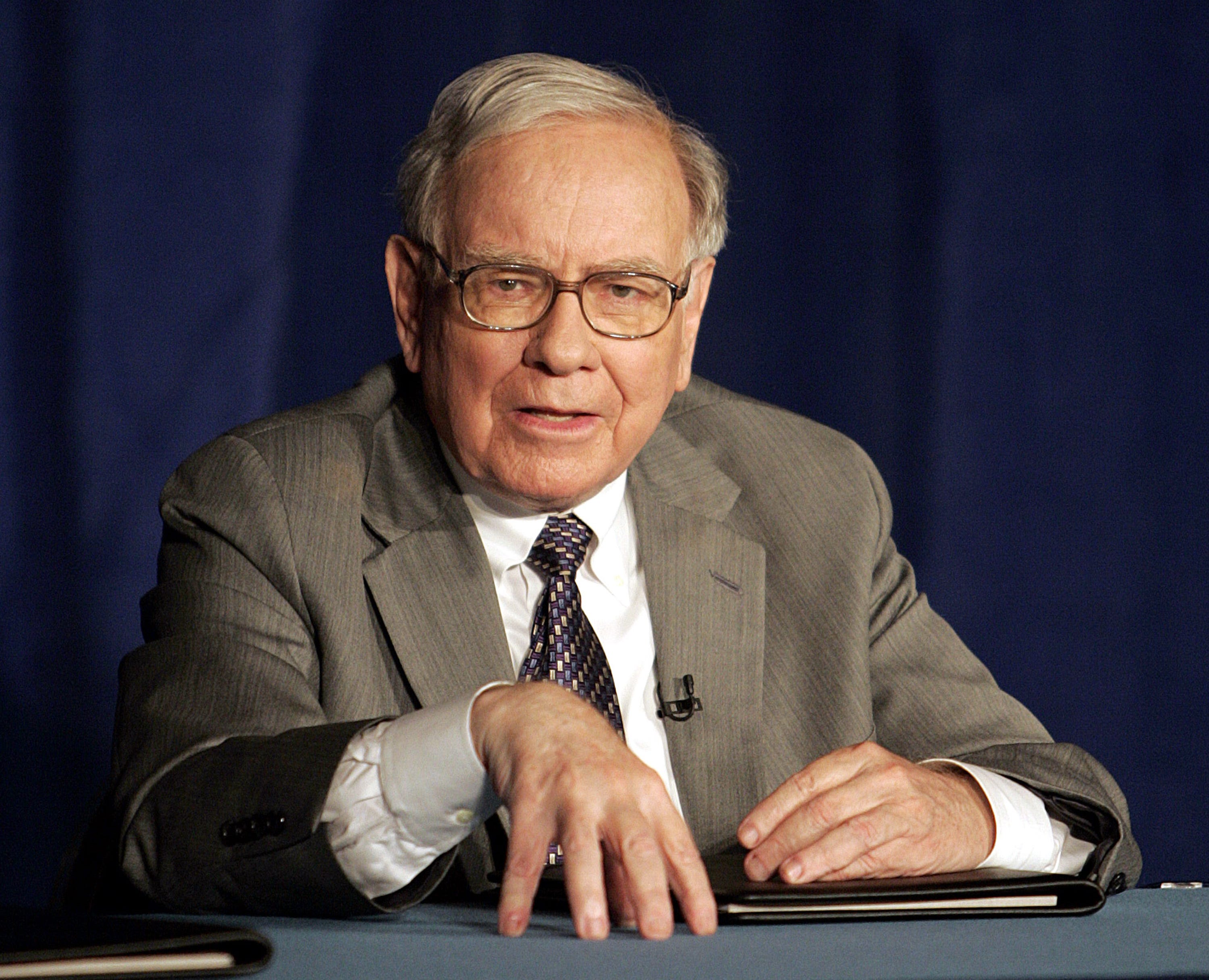
AP Images
Warren Buffett kept quiet when stocks tumbled. The famed investor will break his silence on Saturday with nearly five hours of questions at Berkshire Hathaway’s annual shareholder meeting.
The $1 trillion conglomerate, which Buffett still heads at 94, owns many businesses, including auto insurer Geico and the BNSF Railway, and holds billion-dollar stakes in public companies such as Apple and Coca-Cola. If it’s affecting the US economy, it’s affecting Berkshire. That, combined with Buffett’s decades of investing experience, will have tens of thousands of followers hanging off his every word during the event in his hometown of Omaha.
More than a dozen of Buffett’s close followers told Business Insider the burning questions they want him to answer, from tariff impacts and Berkshire’s cash pile to his retirement plans and Apple disposals.
Trade war fallout
Tariffs have reignited investors’ fears of inflation and recession, sparking an exodus from US stocks, Treasurys, and the dollar in recent weeks.

Markets Insider
“I’d like to hear how the tariffs are affecting Berkshire’s businesses now, and how they may affect the businesses in the future,” Steven Check, the CEO of Check Capital Management, told BI. He also wanted to hear Buffett’s views on tariffs from a global perspective.
Adam Mead, the author of ” The Complete Financial History of Berkshire Hathaway ” and a money manager, told BI that Trump’s tariffs “might change the calculus” for Berkshire’s solar projects, adding they likely source many of their panels and equipment from overseas.
Adam Schwartz, the founder and chief investor of Black Bear Value Partners, told BI he hoped Buffett would address tariffs and advise investors on protecting their portfolios.
Schwartz said, “Does he view the tariff policy as a structural change in the environment, and how do you handicap the downside?”
John Longo — a finance professor, investment chief, and the author of “Buffett’s Tips: A Guide to Financial Literacy and Life” — told BI he hoped Buffett would say whether he still thinks the US trade deficit is an urgent problem as he argued in a Fortune article in 2003.
Spending plans
Buffett nearly doubled Berkshire’s pile of cash, Treasury bills, and other liquid assets to a record $334 billion last year, partly by selling a net $134 billion of stocks and halting share buybacks in the second half.
His followers want to know what he plans to do with that war chest, which exceeds Coca-Cola’s entire market value. He could use the dry powder to make a blockbuster acquisition, scoop up stocks, reinstate share purchases, or even pay a dividend.
“Why is he amassing this huge cash position, and where would the stock market need to fall for him to write ‘Buy American. I Am.‘ like he did in the fall of 2008?” asked Bill Smead, the founder and chief investor of Smead Capital Management.
Smead was referring to Buffett’s famous New York Times op-ed at the height of the financial crisis, in which he urged others to join him in making long-term bets on American businesses.
Alex Morris, the author of “Buffett and Munger Unscripted” and the founder of investment research service TSOH, told BI he was “curious” to hear whether Buffett still believes Berkshire should have a minimum of $30 billion in cash reserves, and what “the largest deal they could do today” would be.
Buffett’s acolytes are also waiting impatiently to learn whether the legendary bargain hunter capitalized on the recent stock plunge.
“Has Berkshire been investing its cash after the sharp market decline in April?” asked David Kass, a finance professor at the University of Maryland and longtime Buffett blogger.
Signature stocks
Berkshire sold 67% of its biggest stock position, Apple, in the first nine months of 2024. But it left the remaining 300 million shares intact in the fourth quarter, even though the iPhone maker’s stock traded higher than it did earlier in the year.
That raises a roughly “$60 billion question of why not sell the whole position?” Mead told BI. “It’s a bit perplexing.”
Darren Pollock, a portfolio manager at Cheviot Value Management, also queried the remaining Apple stake. The stock is down around 12.5% year-to-date.
“He’s Warren Buffett, he obviously has a thoughtful rationale, and I’d love to hear it,” Pollock told BI.
Berkshire businesses
Buffett often sheds light on Berkshire’s myriad subsidiaries during his annual Q&A.
“I always enjoy the color provided on the key businesses,” Paul Lountzis, the president of Lountzis Asset Management, told BI. He reeled off Geico, the overall insurance division, the BNSF Railway, Berkshire Hathaway Energy, and Berkshire’s manufacturing and retailing segments.

Markets Insider
Several followers said they hoped Buffett would compare Geico, the revitalized auto insurer, to its archrival Progressive on profitability, market share, and underwriting expenses.
Mead said he wanted to know why Berkshire valued energy giant BHE below $50 billion in a deal last year to buy a minority interest from his late friend Walter Scott’s estate, despite valuing it closer to $90 billion when Berkshire purchased non-insurance chief Greg Abel’s stake in 2022.
“Is BHE really worth that much less today compared to then, or was that a quirk in the purchase agreement with the Scott estate?” Mead asked.
Winding down
At 94, Buffett has been detailing his estate planning and championing his planned successor, Abel, in his recent letters to shareholders. Kass told BI he’d like to know whether Buffett plans to resign as CEO in the near future.
Others said they were hungry for insights into how Abel would run the company.
Lawrence Cunningham, the author of numerous books about Berkshire and the director of the University of Delaware’s Weinberg Center on Corporate Governance, told BI he wanted to hear from Abel, “particularly his vision for Berkshire’s future and how he plans to uphold the company’s core values and strategic direction.”
Luke Rahbari, the CEO of Equity Armor Investments, told BI he was eager for Abel to elaborate on how he’ll “approach capital allocation, including stock picking and acquisitions, and how might his leadership style differ from Buffett’s?”
Morris referred to how Buffett urged the US government in his latest shareholder letter to use Berkshire’s record tax payment to help the less fortunate.
“Relative to current US policies, what does Warren believe would be the most effective additional way to take care of the people who got the short straws?” he asked.
Brett Gardner, an analyst and the author of the recently released “Buffett’s Early Investments,” told BI he’s crossing his fingers that the Berkshire chief will be asked about some of his findings: such as whether an early bet, Philadelphia and Reading Railroad, was an “inspiration for Berkshire,” and details on how Buffett analyzed the corporate governance risks attached to buying 5% of Disney in 1966.
“Selfishly, I am hoping he gets some questions on my book!” Gardner added.
Brian Gongol, a Buffett superfan who’s been a shareholder since 2007, told BI his question was inspired by Buffett’s oft-repeated advice: “Invest in yourself.”
“I’d like to know what he thinks was Berkshire’s best reinvestment in itself, whether it took place this past year or simply bore fruit in the last year,” he said.
The post Warren Buffett disciples want to know what he plans to do with all that cash appeared first on Business Insider.




